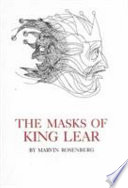 | 1910 - 470 ページ
...me ! " Through the sharp hawthorn blow the winds." Hum ! go to thy bed, and warm thee. LEAR. Did'st thou give all to thy daughters, and art thou come to this? EDG. Who gives anything to poor Tom? whom the foul fiend hath led through fire and through flame, and... | |
 | William Shakespeare - 1912 - 226 ページ
...me ! "Through the sharp hawthorn blow the winds." Hum ! go to thy bed, and warm thee. Lear. Did'st thou give all to thy daughters, and art thou come to this ? 50 Edg. Who gives anything to poor Tom ? whom the foul fiend hath led through fire and through flame,... | |
 | J. L. Styan - 1960 - 320 ページ
...events, the identity between the two forming in our minds is established when we hear from Lear 'Didst thou give all to thy daughters? And art thou come to this?' Lear sees Edgar as himself. We are prepared now not only for the conjunction of the two, even to modern... | |
 | William Shakespeare - 1972 - 356 ページ
...follows me. Through the sharp hawthorn blow the cold winds. Humh! Go to thy bed and warm thee. LEAR Didst thou give all to thy daughters ? And art thou come to this? EDGAR Who gives anything to Poor Tom ? whom the foul fiend hath led through fire and through flame,... | |
 | S. L. Goldberg - 1974 - 212 ページ
...naked wretch in an access of new-found understanding; he identifies the wretch with himself: 'Did'st thou give all to thy daughters?/ And art thou come to this?' (in, iv, 48-9). When he does identify himself with Tom a little later, it is by then quite clearly... | |
 | J. L. Styan - 1975 - 272 ページ
...for the pretence that it is. Only those on stage are deceived, and Lear's reaction is sublime: Didst thou give all to thy daughters? And art thou come to this? (lll.iv) He sees himself in Edgar, appalling in his nakedness. We must here pity Lear as he forsakes... | |
 | Peter Hasenberg - 1981 - 396 ページ
...den Ursachen, die einen momentanen Zustand verursacht haben. Zwar stellt er schon Fragen wie "Didst thou give all to thy daughters? And art thou come to this?" (III. iv. 48-49) oder "What! has his daughters brought him to this pass? Couldst thou save nothing?... | |
 | Lillian Feder - 1983 - 356 ページ
...very feelings unchecked by any remnant of convention or rationality. His first words to Edgar: "Didst thou give all to thy daughters? / And art thou come to this?" express unquestioning identification with the madman (in, iv, 39-49). Lear's struggle to adapt his... | |
 | Jay Clayton, Eric Rothstein - 1991 - 364 ページ
...enters as Poor Tom, followed by "the foul fiend" (III.iv.45), Lear immediately seizes upon him: "Didst thou give all to thy daughters? And art thou come to this?" (Ill.iv.48-49). When Kent suggests that Poor Tom "hath no daughters" (lll.iv.67), Lear rejects the... | |
 | Marvin Rosenberg - 1992 - 456 ページ
...many— questions extends his obsession with all and with daughters over the line into paranoia: Didst thou give all to thy daughters? * And art thou come to this? (48-49.) The question is sometimes asked in the theatre with some wryness; more often Lear, sliding... | |
| |